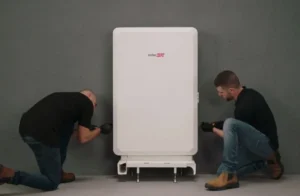Big utilities such as Origin Energy and AGL Energy are maintaining their attack on subsidies for rooftop solar, joining forces with industry lobby groups to call for their removal – just as they prepare to roll out solar leasing schemes of their own.
 Big energy retailers such as Origin Energy and AGL Energy are maintaining their attack on subsidies for rooftop solar, joining forces with industry lobby groups to call for their removal.
Big energy retailers such as Origin Energy and AGL Energy are maintaining their attack on subsidies for rooftop solar, joining forces with industry lobby groups to call for their removal.
Both Origin Energy and AGL Energy want subsidies for small scale solar removed. In submissions to the review of the Renewable Energy Target being conducted by the Climate Change Authority, both argue – along with the Electricity Supply Association, and the Energy Networks Association – that the costs of the technology have fallen enough to justify the removal of the upfront payments under the small scale technology component of the RET.
“Household solar PV now no longer requires subsidies to be an attractive proposition for households,” AGL Energy says in its submission filed last week. It says the small scale solar target has “already exceeded its original policy intent” of 4,000GWh.
Origin Energy says solar PV is forecast to more than treble by 2020 to more than 13,000GWh. It says that even this estimate may be conservative, considering the attractiveness of solar to businesses, particularly with the rollout of leasing models.
Origin Energy says the case for upfront subsidies is mitigated by its declining cost. It wants changes to the price cap, and the deeming period – both of which can be done by regulation rather than legislation. And it wants the system size reduced to a maximum 10kW from 100kW.
The push by Origin Energy and AGL Energy comes as both companies prepare to launch major marketing pushes into the household leasing market.
Origin Energy has flagged its intentions to one columnist, although it is yet to expand on these plans to shareholders and other media, and AGL is also said to be assembling a 150-strong team in Melbourne to attack the solar leasing market. About 30 people are already believed to have been hired. It has labelled solar tariffs as a “scam”. Meanwhile, green groups put Australia’s total fossil fuel subsidies at $47 billion over the next four years.
Both retailers see the push to leasing models as a way of “locking in” their customers for the long term. All energy retailers lose between one fifth and one quarter of their customers each year, as people look for better deals, and the push to “distributed energy”, the emergence of new energy management programs, and the arrival of new business models is threatening to upset their business models.
The South Australian network operator said this week it could see no future for centralized generation, or for retailers, the two components that “gentailers” such as Origin and AGL combine.
Europe’s biggest utility, E.ON decided last month to split its business in two, argung that its old centralized generators could not work hand in hand with the new distributed model based around renewables, storage and smart grids.
By using their balance sheet to offer zero down leasing models, Origin Energy and AGL Energy hope to capture a much bigger share of the solar market. Their position would be helped if the subsidies could be removed.
Origin was once the biggest installer of solar in the country, although AGL never matched its output despite the purchase of a small specialist solar company.
The CCA is due to present its findings to the government on Friday, but there is no word yet on when the report will be released. It is not clear what, if any, weight the government will give to its report.
The Abbott government earlier this year bypassed the CCA and appointed its own review panel headed by the pro-nuclear climate science denier Dick Warburton.
That review recommended scrapping or scaling back the RET dramatically, even though it found maintaining the current target, or expanding it to 2030, would provide the most benefit to consumers.
The Federal Government is determined to slash the large scale scheme to around 26,000GWh – from its current target of 41,000GWh – although it has said there will be no change to rooftop solar for households.
It has, however, remained vague about the fate of systems from 10kW to 100kW, which provide a similar upfront benefit for businesses.
The Federal Government is also being pushed to fold the small scale scheme into the large scale scheme – which would not impact the household sector very much, but would result in less large scale generation being built.
The CCA in 2012 said there was a case for cutting the small scale target from 100kW to 10kW, although it stopped short of actually recommending that action.
The Clean Energy Council says that the extra costs for a small business to deal with the large scale renewable target – in upfront metering and other costs – would amount to more than $10,000.
Meanwhile, Origin Energy, AGL Energy, Queensland government owned coal generator Stanwell Corp, and their industry lobby groups want the 41,000GWh reduced to a “real 20 per cent” – effectively the Abbott government’s line of around 26,000GWh.
Origin wants no more than 1,500MW of large scale wind generation built between now and 2020.
AGL and the ESAA argue that, in any case, the 41,000GWH target cannot be met.
This is contradicted by the CEC, as well as project developers such as Senvion, Infratil, CWP Renewables and Recurrent Energy, who all point out they have several thousand megawatts ready to go.
The Abbott government, as RenewEconomy has reported before, is driven by its antipathy to wind farms. Hence its support for yet another wind energy inquiry, this time stacked with the most virulent anti-wind campaigners in the Senate.
Recurrent suggests that if the government wants more large scale solar, rather than large scale wind, then it could add a premium for day-time generation, or even consider “banding”, a mechanism promoted by independent Senator Nick Xenophon.
The government, meanwhile, continues to play games with the RET, saying it is willing to re-engage with labor on negotiations, but only if there is agreement to cut the target significantly. Labor says it is prepared to accept some minor modifications and cuts, but will not “be party to any policy that cripples the renewable energy industry.”







